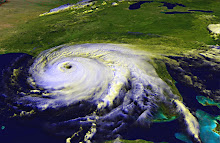You probably remember the days after Hurricane Katrina (2005), when the people of New Orleans were complaining that no one was bringing them food or water.
You probably don't remember hearing those complaints from Mississippi, where Katrina actually made landfall or from Florida after Hurricane Ivan. Maybe we didn't yell as loudly or maybe more people in those areas knew about the storm and had prepared for it.
After Katrina, the federal government came up with a new slogan: "The First 72 Are Up to You." Basically, you must be prepared to take care of yourself and your family for the first three days after the storm passes.
Why? A major hurricane leaves roads covered with debris - trees, power poles, parts of roofs, tin siding, trash. The roads must be cleared before help can arrive. Sometimes, roads and bridges are left impassible by the storm. The tarmac at the airport must be inspected before planes and helicopters can safely land. Your local government is responsible for setting up distribution centers for food, water, and ice. They need to have a large parking lot or other area to deliver these goods. You have to have a way to get there -- another reason for clearing roads of debris.
So, make sure you have the food, water, medicine and first aid supplies that you need to survive for three days. The federal government has a handy checklist online at Ready.gov. If money is an issue, keep in mind you don't necessarily have to buy water -- if you have a cooler, jars, sports bottles, any of those things can be used to store tap water. You just want to make sure that what you put the water in is clean and has a lid so that it doesn't get contaminated with dust, dirt, animal hair or whatever may be floating around after the storm.
Meals after a hurricane don't have to be fancy. You can live off bread or crackers, peanut butter, and potted meat. It's nice to have a variety of foods, but it's not necessary. Do you have a grill? Don't try to use it in the house, but you can cook on it outdoors after the storm passes. You'll need gas or charcoal to fuel it.
After Hurricanes Ivan and Dennis (2005), I heard of big neighborhood parties where everyone who had a grill fired it up and people cooked all the meat from their freezers before it went bad.
You may lose water pressure after the storm, so you'll also need water to flush the toilet. That's where filling your tub comes in handy. Don't try to fill the toilet's tank. The most efficient way is to pour the water directly into the toilet bowl. Pour it slowly. When it gets to a certain point, the toilet will flush itself and you can stop pouring.
Before the storm, make sure your ice chest is clean and ready to take in whatever food and medications need refrigeration. You can make extra ice in the freezer. Blocks of ice will last longer - to make your own, fill a water or milk jug about three-quarters full of water (water expands as it freezes) and put it in the freezer. I wouldn't want to drink out of the milk jug, but when the ice melts, that's water you can use to flush the toilet, at least.
It's easier to see these less expensive options if you're looking ahead at the beginning of hurricane season. When the storm is a day or two away and you're panicked, you can't think as clearly.

No comments:
Post a Comment